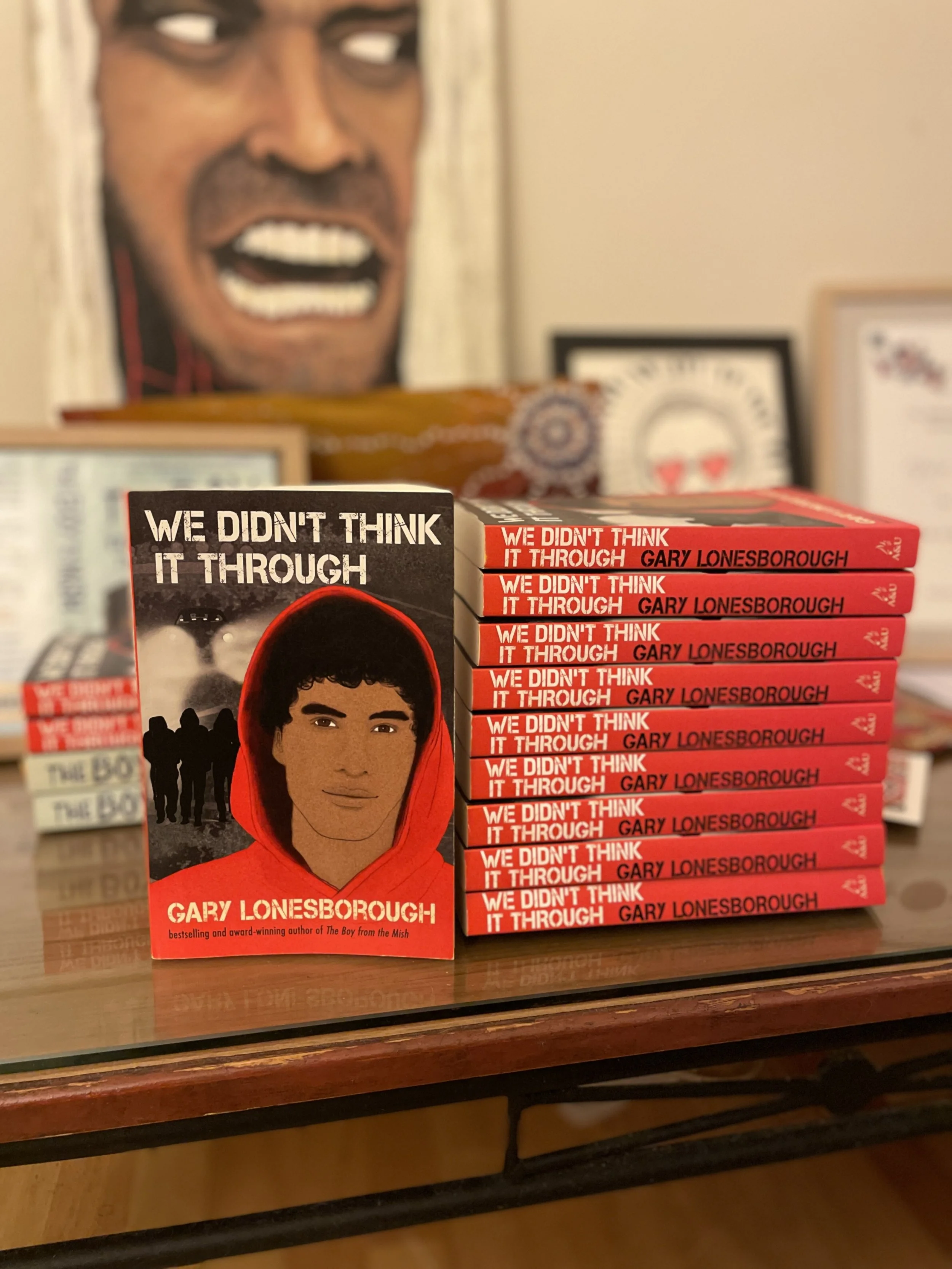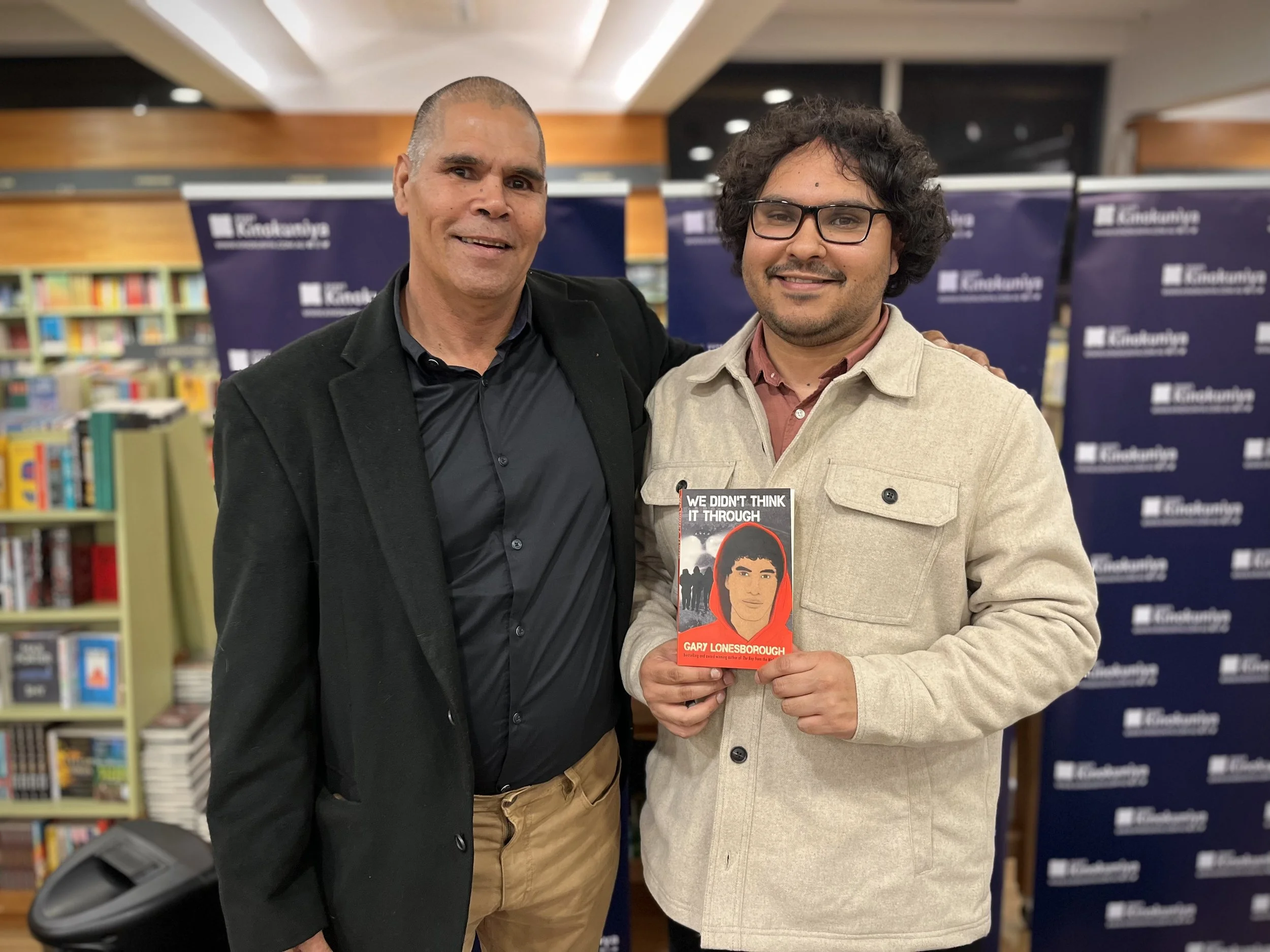Second book
Having a book published was a dream I’d had since I was a kid. For years, I tried to write a novel. I’d stopped and started countless first drafts for various stories - contemporary, fantasy, horror, dystopian fiction. I’d once written 50000 words of a dystopian fiction novel called ‘The Cage’. It was after I’d reached the 50k word mark I realised I was writing a story that was too big for me to tell right now, and worse, I was beginning to think I’d written the story from the wrong character’s perspective!
It took years for me to build the skills and the stamina to write my first book. I assumed I could do it all again with ease when it came to writing the second. I did it once, I could do it again, right? Well, yes, but I came to learn that it’s not that simple. Each story is different, and in July, my second novel was published - WE DIDN’T THINK IT THROUGH.
In 2018, I began facilitating an Aboriginal program at a juvenile justice centre in western Sydney, as part of my role at an Aboriginal organisation. I would go in each Tuesday afternoon and bring in cultural educators, Indigenous youth services and elders, with the aim to teach things to the boys detained there, help them reconnect with their cultural identities and learn about the support they can access when they get released. My favourite part of this job was spending time with the boys, getting to know them, hearing their stories and offering advice. I was stuck in a wrestle between the limitations of my role and this internal need to be the person who helps everyone. It took me a long time to realise I’m just one person doing one job, and I could only help where I could, but it was a frustration I’d never known before. I was a young Aboriginal man in a position to potentially help other young Aboriginal men who had landed in difficult positions, but there was only so much I could actually do outside of the worrying. There were a couple boys I had worked with individually, one for the period of three years. As I worked with them, I was still writing and this character began forming in my mind, who would later become Jamie. I didn’t really know until after I’d finished the book that this was how I could help - I could write a fictional story about the resilience I saw in those boys, a story inspired by theirs and a story that gave those boys a voice - a story that might shine a light on the overrepresentation of Aboriginal youth in juvenile detention and the lack of meaningful support available to them. I realised a long time ago that I am no activist. But writing is my activism. Writing is how I say the things I want to say.
The drafting process for my first book was pretty breezy. I could see the whole story in a series of scenes in my head. It felt like the words were right there at some cliff behind my ears, falling into darkness and I had to write them all down before they disappeared. Within a few months, I’d had the whole structure, the character arcs and the plot points down in a pretty decent way.
When it came time to sit down and start on my second book, I thought it would be the same, that over the course of a first draft it would all come together, that it would only take a couple months to write. I’d let Jamie grow in my head. I’d laid in bed at night, thinking over how his story would become instead of falling asleep. I knew him pretty well, and I had just signed a contract for my first book. I was feeling this overwhelming sense of achievement. I had actually arrived at my dreams, and now it was time to jump higher.
I started writing a first draft for WE DIDNT THINK IT THROUGH in 2019, which was called ‘Joyride’ at the time. The first 20k words flowed well, but then these new doubts started to step into my life: This isn’t as good as my first book… I don’t know where this is going… I can’t write a whole book again.
After a few months of writing, I took a break to edit ‘The Boy from the Mish’, then returned to the manuscript. I finished a 75k word first draft, and unfortunately, I didn’t love it. I landed a residency at the Varuna Writer’s House in Katoomba, which I was due to take in June of 2020 while I was in the drafting stage. This residency was delayed due to covid until November 2020, which turned out to be a real blessing in disguise. During my week there, I learned a lot about the story I thought I was writing, and found a new wind in my second novel. I discovered that I needed to focus more on the family relationships Jamie has and a new thread grew within the story - a story about reconnecting with family. Over the next months, I rewrote the ending chapters, then went back to the middle and rewrote the rest. There was still a lot of work to do, but I had found joy in writing this story again, and for a time, I was able to keep those doubts out of my head.
The edits for this book were tough. I struggled to come up with a title for the longest time, and I probably went through three or four potential titles before I landed on the final one. This edit was harder than my first novel because I was dealing with many big issues and trying to tell a story that kept the character’s journey central, while also saying what I wanted to say. The edit was longer as well, and when I received an email from my publisher that I would need to complete another structural revision, I felt kind of hopeless. I wasn’t sure what more I could do. I thought I’d done it - that the story was good enough. But there were all these issues that weren’t working yet, and I could only see those issues after taking a break from the manuscript. Jamie’s characterization was inconsistent. Some characters weren’t fleshed out as well as they could be. And the middle section of this story was enormous and slow and filled with too many characters who only show up for a scene or two. There was a point during the edit where I thought I was not a good enough writer to get this book in the shape it needed to be, where I thought I wouldn’t be able to realise the vision I saw in my mind. I thought I might be a one-book wonder.
Surely, it shouldn’t be this hard if I was a good writer.
I got back to work with some expert guidance and suggestions from my publisher and editor, and it was a real team effort to get this book in shape. Ultimately, I am very pleased with what the final draft became. I love Jamie, the way his story unfolds, the infusion of poetry and balanced way I was able to say what I wanted to say without being too loud.
As I approached the release date, it was already apparent that my first book, The Boy from the Mish, had exceeded all my expectations. It had sold very well, been shortlisted for numerous awards (even winning a couple), and had sold international rights, audio rights and film/tv rights. As the release date approached for We Didn’t Think It Through, new doubting thoughts began to intrude again.
It’s not gonna do as well as Boy from the Mish.
No one’s going to read it. No one cares.
No one’s going to like it.
It’s not an explicitly queer story, so I am going to lose all my readers.
The doubts didn’t leave until I launched We Didn’t Think It Through in Sydney on the 6th of July 2023. I was able to present my book to the world, surrounded by friends and even my dad, who had made the trip up from Bega. As I read a small passage from the book, I felt something about this book that I hadn’t felt in a long time: this is actually pretty good. I’m proud of the work I did.
It was bittersweet, knowing how hard me and my publisher and editor worked to get this book to where it is, knowing how much worry and fear I had for my talents as a writer and the success of the book. But it is a book. A second book. I am a person who has had multiple books published, and that’s something I am extremely proud of.
The post-release depression hit hard. I knew it was coming, because it came after the release of my first book, but it was still a difficult road to travel. The basis of this depression is coming down from the high that release-week brings, when everyone wants to talk to you, everyone is saying they want to read it, social media notifications are popping off because everyone is excited and hyping your work. After a couple weeks, it’s the complete opposite. It’s part of the job and something I’ll try to be better prepared for next time (but maybe post-release depression deserves it’s own blog!).
I realise now that I can’t compare my current project to previous ones. Each story is different. Each editing experience is different. That’s how it is. I’m hoping when the time comes for my third book I will be more resilient, more confident, and not so caught up on how it will compare to my previous novels. Each new thing is a new thing. And in the end, I get to do what I always dreamed of doing. I get to write stories. I love writing stories. Writing is fun for me. Writing doesn’t feel like work. It’s not a burden. It’s an inherent part of who I am. Whether people read my stories, or like them as much as the last one, or like them more, that shouldn’t matter to me. Each time I write, I am writing something real, I am creating a character and creating a world. Each time it is new and fresh and I can’t dwell on what came before.
We Didn’t Think It Through is out in the world. It belongs to the world now, and it is time for me to move onto the next thing.


